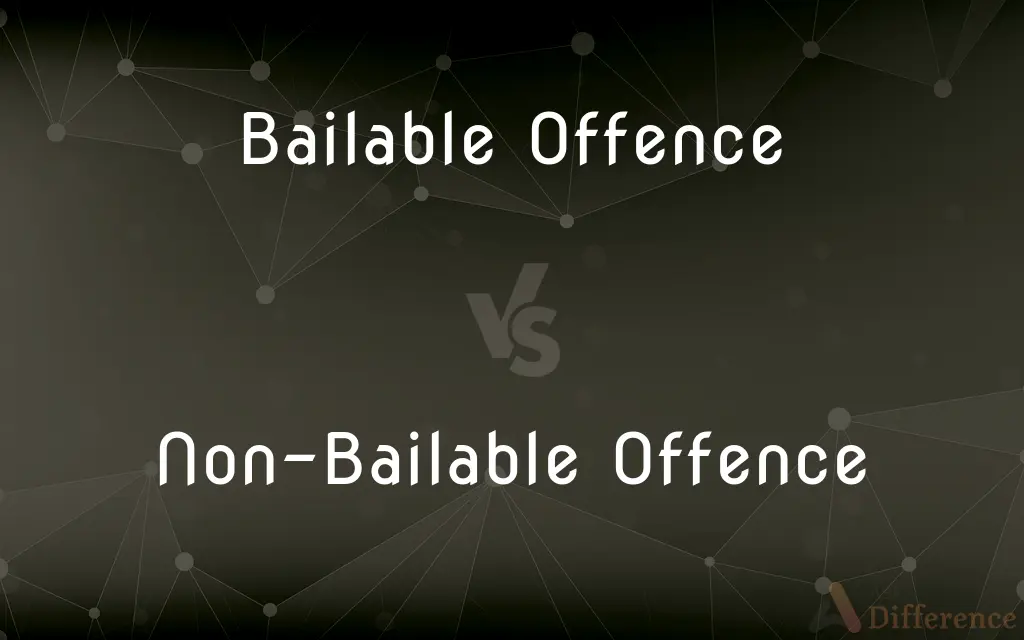Bailable Offence vs. Non-Bailable Offence — What's the Difference?
Edited by Tayyaba Rehman — By Fiza Rafique — Published on December 31, 2023
A Bailable Offence allows the defendant to be released on bail, typically for less serious crimes. A Non-Bailable Offence generally denies bail due to the crime's severity or potential flight risk.

Difference Between Bailable Offence and Non-Bailable Offence
Table of Contents
ADVERTISEMENT
Key Differences
In the realm of legal proceedings, both Bailable Offence and Non-Bailable Offence determine a person's eligibility to be released on bail after being arrested. When someone is charged with a Bailable Offence, they have a statutory right to be granted bail. This means that the law typically considers such offences to be of a less severe nature, and the defendant poses a lower risk of fleeing before the trial.
On the contrary, a Non-Bailable Offence implies that bail is not automatically granted. Instead, the decision rests in the hands of the judiciary, who assesses various factors, including the crime's severity and the accused's likelihood of tampering with evidence or influencing witnesses. Given the gravity attached to Non-Bailable Offences, they are often seen as more grievous crimes in the eyes of the law.
It's essential to understand that a Bailable Offence doesn't negate the seriousness of the crime, but rather suggests a legal provision for the accused to secure temporary freedom till the case's conclusion. This can be contingent on certain conditions, like the submission of a bail bond. In contrast, a Non-Bailable Offence underscores the gravity of the crime, and the court's discretion plays a pivotal role in determining whether or not bail should be granted.
One might ponder why such distinctions between Bailable Offence and Non-Bailable Offence exist. The law seeks a balance between respecting individual rights and ensuring societal safety. By distinguishing between the two, the law can accommodate those with lesser charges, while simultaneously exercising caution with those charged with severe crimes.
Comparison Chart
Bail Grant
Automatically eligible
At the discretion of the court
ADVERTISEMENT
Nature of Crime
Typically less severe
Generally more severe or grievous
Rights of the Accused
Statutory right to bail
No automatic right to bail
Judicial Discretion
Limited (as bail is a right)
Significant, as bail isn't guaranteed
Examples
Petty theft, minor assault
Murder, rape, terrorism
Compare with Definitions
Bailable Offence
A crime for which the accused has an inherent right to bail.
He was charged with a Bailable Offence and was released the same day.
Non-Bailable Offence
An offence requiring the court's discretion for bail.
The case involved a Non-Bailable Offence, so the judge deliberated on the bail decision.
Bailable Offence
An offence deemed less severe in the eyes of the law.
Despite the altercation, it was categorized as a Bailable Offence.
Non-Bailable Offence
An offence suggesting potential flight risk or evidence tampering.
His prior history made the charge a Non-Bailable Offence.
Bailable Offence
An offence that doesn't mandate judicial discretion for bail.
As it was a Bailable Offence, the court clerk processed his bail quickly.
Non-Bailable Offence
A crime perceived as grievous or heinous.
Due to the violent nature, it was classified as a Non-Bailable Offence.
Bailable Offence
A crime where the accused can secure temporary freedom by fulfilling certain conditions.
Although a Bailable Offence, he had to submit a substantial amount for his release.
Non-Bailable Offence
A legal charge where bail is conditional and not a right.
Despite his pleas, the charges were a Non-Bailable Offence, making bail uncertain.
Bailable Offence
A legal charge where bail is generally granted.
Given the nature of the theft, it was considered a Bailable Offence.
Non-Bailable Offence
A serious crime where bail isn't automatically granted.
Given the severity, his charges were termed a Non-Bailable Offence.
Common Curiosities
Can one never get bail for a Non-Bailable Offence?
Not necessarily. The court may grant bail for a Non-Bailable Offence based on various factors, including the evidence and circumstances.
How does a Non-Bailable Offence differ?
In a Non-Bailable Offence, bail is not automatically granted and is subject to the court's discretion.
Are bail amounts the same for all Bailable Offences?
No, bail amounts can vary depending on the crime's nature and other factors.
Is there a time limit for granting bail in a Bailable Offence?
It generally depends on local regulations, but for Bailable Offences, bail is usually processed swiftly.
What is a Bailable Offence?
A Bailable Offence is a crime for which the accused has an automatic right to be granted bail.
What determines if an offence is bailable or not?
The classification is typically based on the crime's severity, societal impact, and potential flight risk.
Can the categorization change between Bailable Offence and Non-Bailable Offence?
Laws evolve, and offenses can be reclassified, but such changes require legislative action.
Is every Bailable Offence a minor crime?
No, a Bailable Offence can be serious, but the law allows for the accused's release on bail.
Can bail be denied for a Bailable Offence?
Rarely. Unless there are exceptional reasons, bail is typically granted for Bailable Offences.
What happens if someone commits both Bailable and Non-Bailable Offences?
Each offence is treated separately. While bail might be granted for the Bailable Offence, the Non-Bailable Offence would require judicial discretion.
Share Your Discovery

Previous Comparison
Dihydrogen Monoxide vs. Water
Next Comparison
HQ vs. HDAuthor Spotlight
Written by
Fiza RafiqueFiza Rafique is a skilled content writer at AskDifference.com, where she meticulously refines and enhances written pieces. Drawing from her vast editorial expertise, Fiza ensures clarity, accuracy, and precision in every article. Passionate about language, she continually seeks to elevate the quality of content for readers worldwide.
Edited by
Tayyaba RehmanTayyaba Rehman is a distinguished writer, currently serving as a primary contributor to askdifference.com. As a researcher in semantics and etymology, Tayyaba's passion for the complexity of languages and their distinctions has found a perfect home on the platform. Tayyaba delves into the intricacies of language, distinguishing between commonly confused words and phrases, thereby providing clarity for readers worldwide.














































